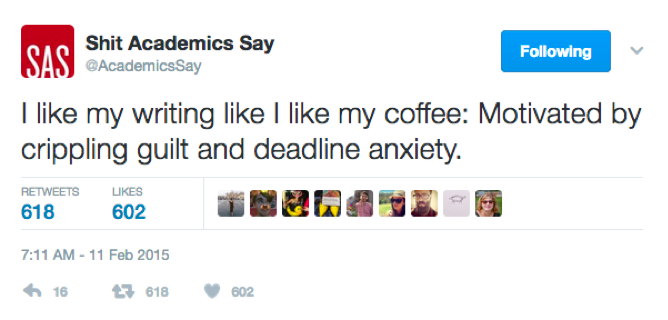
 Every community has its own law. But academia’s penchant for the oppressive ought, its tilt toward domineering expectations of accomplishment is, one could say, special. The undergraduate — once justified by acceptance into the right college — is freighted with the inadequacy of not having gotten into the right MA program. Should this happen, the weight of PhD applications hovers like a fixed cloud. If the sun of acceptance breaks through, the gathering storm of comprehensive exams billows on the horizon. When these pass, the student — known now as a “PhD candidate” — is exiled into the desert of ABD (all but dissertation) status from which many never return. If they survive, the brief oasis of a PhD defense is followed by an even larger Sahara of having not yet received a tenure track position, alleviated with intermittent sips from the post-doctoral fellowship canteen (refillable no more than three times). Even should a permanent position be attained, the firehose of first year teaching is enough to evoke nostalgia for the post-doc desert. And then comes the shame of the unpublished book, a hostile conference reception, or the gut-plunging shank thrust through the darkness of blind peer review. The fights are so bitter, goes the well-known saying, because the stakes are so small. And should the book be published, cringes over its unfair reception is welcome relief from the crushing expectations of book number two, and three, and four.
Every community has its own law. But academia’s penchant for the oppressive ought, its tilt toward domineering expectations of accomplishment is, one could say, special. The undergraduate — once justified by acceptance into the right college — is freighted with the inadequacy of not having gotten into the right MA program. Should this happen, the weight of PhD applications hovers like a fixed cloud. If the sun of acceptance breaks through, the gathering storm of comprehensive exams billows on the horizon. When these pass, the student — known now as a “PhD candidate” — is exiled into the desert of ABD (all but dissertation) status from which many never return. If they survive, the brief oasis of a PhD defense is followed by an even larger Sahara of having not yet received a tenure track position, alleviated with intermittent sips from the post-doctoral fellowship canteen (refillable no more than three times). Even should a permanent position be attained, the firehose of first year teaching is enough to evoke nostalgia for the post-doc desert. And then comes the shame of the unpublished book, a hostile conference reception, or the gut-plunging shank thrust through the darkness of blind peer review. The fights are so bitter, goes the well-known saying, because the stakes are so small. And should the book be published, cringes over its unfair reception is welcome relief from the crushing expectations of book number two, and three, and four.
Tenure fixes nothing. Once writing guilt — the eating disorder of academia — settles on its host, promise of steady employment does little to extract it. The weight of administrative and committee responsibilities, furthermore, sours the sweetness of security. I have seen full chaired professors glare with condescension at the complaining junior profs, snarling, “Do you think the work stops after tenure?” He too, all of us in the room then realized, had experienced no relief. Each of these academic stages promises a satisfaction which each step immediately defers. Call it a chain of mirages, penultimacy in ultimacy’s clothing, decoy Sabbaths. And even emeritus professors, whose sweet rest is won, are freighted with the guilt of having not spent time with the kids along the way.
 It is no surprise that magmic outlets of red-hot relief frequently erupt from this volcanic system, whether through Shit Academics Say, the CV of failure, or the burgeoning genre of those who gave it all up. There is a sort of grace in these academic declarations of independence. Even so, every such article — silently subtitled “later, suckers!” — feels like its own merit of accomplishment as well. These exiles are justified by leaving the system in which one would have been justified if the game wasn’t rigged. I’ve known more than a few professional writers who wear the fact that they dropped out of their PhD program as proudly as an honorary doctorate.
It is no surprise that magmic outlets of red-hot relief frequently erupt from this volcanic system, whether through Shit Academics Say, the CV of failure, or the burgeoning genre of those who gave it all up. There is a sort of grace in these academic declarations of independence. Even so, every such article — silently subtitled “later, suckers!” — feels like its own merit of accomplishment as well. These exiles are justified by leaving the system in which one would have been justified if the game wasn’t rigged. I’ve known more than a few professional writers who wear the fact that they dropped out of their PhD program as proudly as an honorary doctorate.
A peek into the darkness of the human heart is enough to explain the academic network of subjection just described, but a look into the origins of the modern university helps as well. In his fantastic study of the rise of the German research university — which remains the model for American institutions today — Chad Wellmon explains it sprung from the bosom of German Protestantism, though any echoes of grace faded along the way. Indeed, he tells the story of the modern academia as a chapter in the history of religions. The roots of the modern graduate “seminar,” for example, are in the early eighteenth-century seminaries of Pietist Germany to train ministers. But as free thinkers attempted to fill the epistemic vacuum left in the wake of Protestant and Catholic disputes, theological questions were bracketed.
The science of research (Wissenschaft) eclipsed early Pietist patterns of instruction, and its claims are anything but modest. Science “seizes the entirety of one’s being and provides a determinate direction,” claimed Henrik Steffens in 1809. For Fichte, science “perfects the human…it is a complete life,” uniting “brilliance, virtue, religion.” As Thomas Howard points out in a different study, the University for Fichte was nothing less than “the most holy thing which the human race possesses…a visible representation of the immortality of our race.” Of course, an enterprise of this scale demanded “near total commitment” from participants. And as Wellmon tells the story, the project simply failed. The modern university no longer seeks to “sustain the longings for unity and purpose that its idealist and romantic forbearers endowed it with.” Universities are now just excellence machines. A former president of the University of California confesses it to be a “mechanism held together by administrative rules and powered by money.” Universities are now, as Christopher Olaf Blum once quipped, “a chance collection of individuals building their careers.”
And this means that what Paul Zahl said about careerism could equally apply to academia:
Not only is career, from the standpoint of grace, a mighty joke — for a career spits you out as rapidly as it sucks you in — not only is it dominated overwhelmingly by the principles of law as it fixes your path, but grace declares the real “work” is created only when it springs from belovedness. Grace declares the end of all career paths that envisage a concrete goal. In grace, work — the best and most enduring work — is “fruit” as unstudied and uncontrived as the peaches in Chilton County, Alabama. The irony of grace is not only that it sabotages any interview you might have with a Wall Street Firm [or R1 University] but that it actually prepares you to do the best work you will ever do if you should actually land the job…Under grace, career advances only one way: away from the wreckage of the “I” and the absence of any fixed need for achievement.
Whatever academia viewed sub specie gratiae might look like, I imagine it would far more resemble the Pietist predecessors to the modern research University than its contemporary descendants. Wellmon relates how “before the late eighteenth century, success for a professor had not been, primarily at least, a function of scholarly publication, but rather a combination of teaching, collegiality, seniority, popularity, and just as often, family ties.” Diligent attention to students was then a necessary prerequisite to successful lectures which brought divine ideas to dynamic life in the classroom. Consumed with this task of student formation (Bildung), universities at this stage resisted the institutionalization of research because genuine new discoveries are often come upon by chance anyway. “University professors could not be pressured to produce something they could not control.”
Nor is this to say that life under grace in academia is devoid of breakthrough discoveries. Grace, after all, offers the breathing space for genuine insights to emerge. Though such progress happens not by slavishly meeting the profession’s relentless demands, but by transcending them. And all such accomplishments — gifts that they are — preclude boasting. One of the most accomplished scholars I know performs a meditative exercise in which he invites Jesus to his home, where they cheerfully converse by a fire fueled by his impressive stack of university press publications. This is precisely the opposite of Jean-Jacques Rousseau’s famous articulation of the academic self-justification project:
Let the trumpet of the day of judgment sound when it will, I shall appear with this book in my hand before the Sovereign Judge, and cry with a loud voice, This is my work, there were my thoughts, and thus was I.
But that’s just French bullshit. There is no justification by footnote alone. Life is not to write, but to be written. Absolution comes only by our gracious inclusion in the Lamb’s Book of Life, and we did not write it ourselves.

COMMENTS
3 responses to “Publish and Perish: Law in Academia”
Leave a Reply














Relieving. Thank you, Matthew
Excellent discussion